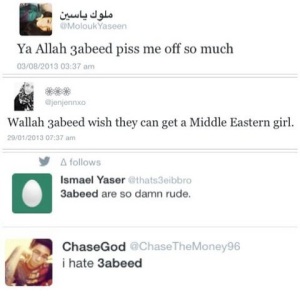godkiller
"We are the Fury"
https://dawudwalid.wordpress.com/2013/11/24/responses-to-my-calling-out-the-term-abeed/
Responses to my calling out the term ‘abeed’
Two months ago, I wrote an oped titled “Fellow humans are not abeed” for the Arab American News to address the usage of the term abeed, meaning slaves, used by many Arabs to describe black people. After receiving some positive feedback from some of my Arab-American friends, primarily in Metro Detroit, I decided to search Twitter for the usage of this term in varying transliterations (abeed, 3abeed, 3beed, 3bid, 3abid & 3abed). What I found was very casual usage of the term, almost exclusively from teenagers and young adults, who are Arab-Americans and appear to have been raised in the USA.


I decided at this point to not comment directly to those tweeps, but to merely tweet my article at them with the hopes that they read it and stop calling black people slaves. What I’ve experienced from doing this as well as later engaging some of these tweeps in the past two months continue to be four things.
The first is that some simply have not responded to the article when I sent it to them. Some continue to tweet in which I have not seen them tweet abeed again. Others have continued to use the slur.
The second response is that some have actually apologized for using the term. Of those, some of them also said that they didn’t know abeed meant slaves. They said that their families simple refer to all blacks as abeed. This is a deeper structural issue of racism among Arabs, primarily in the Levant, which I plan on writing about later.
The third response is that of defending the usage of the term abeed that we are all abeedullah (slaves of Allah), and that I should stop being so touchy. Of course, this is insincere because they don’t really view blacks as the best worshippers, nor do they call other Arabs with light skin including their own family abeed. Calling anyone slave is haram (forbidden) anyway according to the Qur’an and Sunnah.
The last of the responses has been horrendous, which involve cussing me out to calling me a slave.


Some Arab-Americans who joined me in calling out the usage of abeed themselves have even been attacked. One tactic of shame used is calling someone “abeed lover” like how white supremacists say “****** lover.”

An Arab American colleague of mine is in the planning stages of starting a national campaign to address not just this nomenclature issue, but the broader issue of anti-black racism among Arabs. Keep in mind that there are Arabs who have dark skin that would be considered black in the USA if looked upon strictly by physical characteristics.
In the interim, an Arab American friend of mine in Michigan has started the twitter account Arab AntiBlack Racism to call out anti-black racism among Arabs and to challenge fellow Arabs on Twitter not to be passive observers when seeing slurs hurled against blacks.
This issue is a race of the tortoise not the hare. There are deep roots of tribalism and colorism in the Arab world, which pre-date colonialism, were encouraged during colonialism and further solidified within many Arab Americans based upon America’s racial hierarchy.
I also keenly realize that if Muslims sincerely strive to effectively challenge Islamopobia, there needs to be a simultaneous effort to combat ethnic bigotry among Muslims. The Creator helps those who have spiritual integrity and authenticity. It’s not authentic to talk about Islamophobia and Arabophobia while being silent on its cancer-like manifestations among Muslims and Arabs. Also, this is not simply Arab on black racism that Muslims need to face. There is Somali on “Bantu” racism, black on white bigotry among some in Islamic centers, colorism between Pakistanis and Bengalis, etc.
Given, however, that the most overt discrimination that I see on Twitter is Arab on black racism and my personal interests as a black man, who has felt my share of anti-black racism in the heart of Arab America, Metro Detroit, I’m obliged to deal with this most entrenched form that I see. This is in no way an indictment on all Arab Americans. I do know, however, that this issue has been dealt with too passively for many years. Problems don’t fix themselves on their own as proof of the racism exhibited by those born and raised in the USA. I hope that my challenging it will push more Arab Americans to take more aggressive stands against anti-black racism.
Responses to my calling out the term ‘abeed’
Two months ago, I wrote an oped titled “Fellow humans are not abeed” for the Arab American News to address the usage of the term abeed, meaning slaves, used by many Arabs to describe black people. After receiving some positive feedback from some of my Arab-American friends, primarily in Metro Detroit, I decided to search Twitter for the usage of this term in varying transliterations (abeed, 3abeed, 3beed, 3bid, 3abid & 3abed). What I found was very casual usage of the term, almost exclusively from teenagers and young adults, who are Arab-Americans and appear to have been raised in the USA.


I decided at this point to not comment directly to those tweeps, but to merely tweet my article at them with the hopes that they read it and stop calling black people slaves. What I’ve experienced from doing this as well as later engaging some of these tweeps in the past two months continue to be four things.
The first is that some simply have not responded to the article when I sent it to them. Some continue to tweet in which I have not seen them tweet abeed again. Others have continued to use the slur.
The second response is that some have actually apologized for using the term. Of those, some of them also said that they didn’t know abeed meant slaves. They said that their families simple refer to all blacks as abeed. This is a deeper structural issue of racism among Arabs, primarily in the Levant, which I plan on writing about later.
The third response is that of defending the usage of the term abeed that we are all abeedullah (slaves of Allah), and that I should stop being so touchy. Of course, this is insincere because they don’t really view blacks as the best worshippers, nor do they call other Arabs with light skin including their own family abeed. Calling anyone slave is haram (forbidden) anyway according to the Qur’an and Sunnah.
The last of the responses has been horrendous, which involve cussing me out to calling me a slave.


Some Arab-Americans who joined me in calling out the usage of abeed themselves have even been attacked. One tactic of shame used is calling someone “abeed lover” like how white supremacists say “****** lover.”

An Arab American colleague of mine is in the planning stages of starting a national campaign to address not just this nomenclature issue, but the broader issue of anti-black racism among Arabs. Keep in mind that there are Arabs who have dark skin that would be considered black in the USA if looked upon strictly by physical characteristics.
In the interim, an Arab American friend of mine in Michigan has started the twitter account Arab AntiBlack Racism to call out anti-black racism among Arabs and to challenge fellow Arabs on Twitter not to be passive observers when seeing slurs hurled against blacks.
This issue is a race of the tortoise not the hare. There are deep roots of tribalism and colorism in the Arab world, which pre-date colonialism, were encouraged during colonialism and further solidified within many Arab Americans based upon America’s racial hierarchy.
I also keenly realize that if Muslims sincerely strive to effectively challenge Islamopobia, there needs to be a simultaneous effort to combat ethnic bigotry among Muslims. The Creator helps those who have spiritual integrity and authenticity. It’s not authentic to talk about Islamophobia and Arabophobia while being silent on its cancer-like manifestations among Muslims and Arabs. Also, this is not simply Arab on black racism that Muslims need to face. There is Somali on “Bantu” racism, black on white bigotry among some in Islamic centers, colorism between Pakistanis and Bengalis, etc.
Given, however, that the most overt discrimination that I see on Twitter is Arab on black racism and my personal interests as a black man, who has felt my share of anti-black racism in the heart of Arab America, Metro Detroit, I’m obliged to deal with this most entrenched form that I see. This is in no way an indictment on all Arab Americans. I do know, however, that this issue has been dealt with too passively for many years. Problems don’t fix themselves on their own as proof of the racism exhibited by those born and raised in the USA. I hope that my challenging it will push more Arab Americans to take more aggressive stands against anti-black racism.








